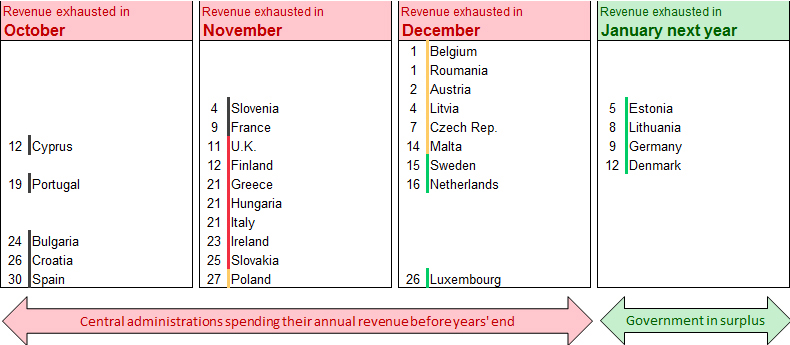Tomorrow, the French government will have used up all of its resources and will end the year by going deeper into debt – France is one of the few countries to run deficits at all levels
Media release
Paris, November 08, 2015 – Using data from Eurostat, the Institut économique Molinari has calculated the dates when each state in the European Union has spent all of its annual revenue.
The first edition of this study shows that:
– France’s central administration has spent its entire resources as of November 9, which is 16 days earlier than the November 25 average for the rest of the European Union;
– France is one of the few countries, alongside Belgium, the Netherlands, Poland and Slovakia, to run deficits at all three administrative levels (central administration, local authorities and social security).
Calendar of dates when central administrations have spent all their revenue

KEY LESSONS
Central administrations are the main source of public deficits
Across the EU, lack of budgetary restraint by central administrations accounts for most of the slippage in public accounts. Local and social security administrations traditionally balance their books better than central governments.
Among the 28 central administrations in the EU, only four are in surplus – Denmark, with a surplus equal to 11 days’ spending, Germany, Lithuania and Estonia each with surpluses of five to eight days’ spending. Their revenue for the year enables them to finance spending for the current year and to reduce their debt.
The other 24 central administrations are spending their entire revenue before the end of the year.
Taken over all, with every type of administration combined, public administrations in the EU are using up all their revenue 23 days before the end of the year.
The central administration’s financial position is deteriorating in both real and relative terms
Since 1980, every fiscal year has been out of balance. Beyond the jolts from temporary disruptions, the situation has been deteriorating. On average, the day when all resources are used up has been moving up by 1.5 days per year since 1980. The worst performance dates back to 2009, with 93 days of unfinanced spending, a far more dismal result than was seen in 1984, 1993 or 2003. Also, the occasional “bubble” has become less significant. The 1989 bubble provided for the government deficit to be limited to 19 days, while the one in 2013 still left it at 51 days.
In relative terms, we can see that the French situation has become a cause of concern. The French state and its various central administrative bodies have consistently ranked near the bottom. France has averaged 19th out of 24 countries over 20 years, 25th out of 27 countries over 10 years, 21st out of 28 over five years and 22nd out of 28 last year, leaving the country stuck low in the rankings.
Even in recent times, marked by a significant increase in compulsory levies, the situation is not getting any better compared to the other EU countries. In 2014, the gap between France and the EU average widened further. The French central administration had used up all its resources on November 9, which was 16 days earlier than the rest of the European Union, which on average exhausts its resources on November 25.
Enduring imbalances at all three levels of administration
The central administration is not the only one in France that fails to balance its books. This is also the case with local authorities, which use all their revenue six days before the end of the year, and with the social security administrations, which use up their revenue five days before the end of the year.
Over all, taking all public administrations together, the French situation is deteriorating in both real and relative terms. While over the last 20 years they had used up their budget 24 days before the end of the year, they were short 25 days last year. Whereas France ranked 12th on average out of 24 countries over 20 years, it now ranks 18th out of 28.
Enduring imbalances despite a significant rise in public revenue
We should note that the endurance of public deficits is in no way due to a decline in public revenue. In relation to GDP, public revenue has been rising significantly in France for decades, climbing from 43.2% of GDP in 1978 to 53.6% in 2014. This amounts to an increase of 10.4 points in 37 years, or 0.28 points per year.
The endurance of deficits is due to an even more rapid rise in public spending, which went from 44.9% of GDP in 1978 to 57.5% in 2014. This represents an increase of 12.6 points in 37 years, or 0.34 points per year.
Quote from Cécile Philippe, director of the Institut économique Molinari (IEM) and co-author
“In contrast to the rest of the EU, public spending in France continues to rise. It now amounts to 57.5% of GDP, topping the previous record set in 2009. The situation is radically different in the EU as a whole, with a two-point decline compared to 2009.
This discrepancy between France and the rest of the EU shows the magnitude of the stakes, in a country where it is common to stigmatize ‘budget austerity’, which does not exist, and to underestimate the effects of ‘tax austerity’.
We have reached an unparalleled level of spending and revenue, which greatly increases the adverse effects and hinders the chances of a sustainable recovery in the economy that could drastically reduce unemployment. The adjustment variable, with a perpetual rise in medium-term and even short-term debt, is a source of risk for taxpayers as well as for future generations and for holders of public debt.”
The study in French is available on our website.
* * *
The Institut économique Molinari (IEM) is an independent, non-profit research and educational organization. Its mission is to promote an economic approach to the study of public policy issues by offering innovative solutions that foster prosperity for all.
– 30 –
Information and interview requests:
Cécile Philippe – director, Institut économique Molinari
(Paris, Brussels, in French or English)
cecile@institutmolinari.org
+33 6 78 86 98 58
Or Nicolas Marques – associate researcher, Institut économique Molinari
(Paris, in French)
nicolas@institutmolinari.org
+33 6 64 94 80 61





